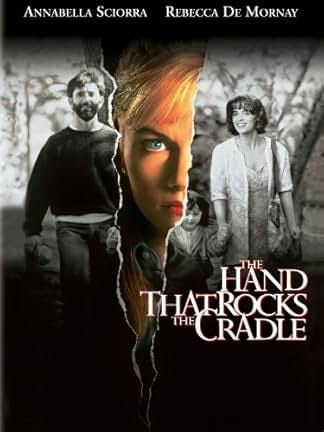You remember that joke about the hipster dog, right?
He says: “There’s this great sound frequency. But you probably have never heard it.”

Same with Greek myth. Lots of folk say their favorite ancient tale is the one about Persephone and Hades. But fewer readers have ever heard of the part that is my favorite.
I thought of that favorite part recently when I watched A Deadly American Marriage, the Netflix documentary about the murder of Jason Corbett.
Connection? I know, I know. Hear me out.
The favorite part in question is a chapter from the Homeric Hymn to Demeter, the original source of the Persephone and Hades story.
A Homeric hymn is a poem that praises a specific Olympian divinity. There are lots of these hymns. The Homer who wrote the Iliad and the Odyssey is traditionally thought of as their author (thus the “Homeric” label).
Some hymns are very short. Others contain full stories. The one to Demeter is the latter kind.
The first and last parts of the hymn detail what happens to Persephone when Hades decides to marry her. Those parts are the familiar ones about Hades snatching her away underground, then offering her pomegranate seeds to eat, with the final determination that she will spend some of the year in the Underworld, and some of it with her mother Demeter on Olympus.
The middle part follows Demeter as she grieves the loss of her daughter and then puts plans into action to change her situation.
From this middle part, you might already know about Demeter’s scheme to blackmail the gods into giving Persephone back to her by stopping all growth of vegetation. Zeus, faced with the extinction of all humans and animals (and therefore animal sacrifice), gives in to Demeter’s demands.
But before that, the grief-stricken Demeter decides on a different plan.
In this plan, she will enter a human household posing as a nanny and groom a human child to become divine, thus replacing Persephone.
First, of course, she has to find a suitable household:
Vexed in her dear heart, Demeter sat near the wayside by the Maiden Well, from which the women of the place were used to draw water, in a shady place over which grew an olive shrub. And she was like an ancient woman who is cut off from childbearing and the gifts of garland-loving Aphrodite, like the nurses of kings' children who deal justice, or like the housekeepers in their echoing halls.
There she was spotted by the daughters of King Celeus of the town of Eleusis as they were coming for easy-drawn water, to carry it in pitchers of bronze to their dear father's house: four were they and like goddesses in the flower of their girlhood, Callidice and Cleisidice and lovely Demo and Callithoe who was the eldest of them all. They knew her not, for the gods are not easily discerned by mortals, but standing near by her spoke winged words:
“Old mother, whence and who are you of folk born long ago? Why are you gone away from the city and do not draw near the houses? For there in the shady halls are women of just such age as you, and others younger; and they would welcome you both by word and by deed.”
(Translations here with a few of my own revisions for clarity)

Demeter makes up a story about being kidnapped from Crete, but escaping her captors. Then she says
“…May all those who dwell on Olympus give you husbands and birth of children as parents desire, so you take pity on me, maidens, and show me this clearly that I may learn, dear children, to the house of what man and woman I may go, to work for them cheerfully at such tasks as belong to a woman of my age. Well could I nurse a new born child, holding him in my arms, or keep house, or spread my masters' bed in a recess of the well-built chamber, or teach the women their work.”
The princesses eagerly recommend that Demeter go for a job taking care of their little brother Demophoon (De-MAH-foh-on). Demeter has that divine charisma and attraction that happens when an immortal in Greek Mythology can’t quite one hundred percent conceal her identity in the guise of a human, so they think she’s a lucky find.
Once Demeter is hired, she goes about divinizing Demophoon:
…she took the child in her fragrant bosom with her divine hands: and his mother Queen Metaneira was glad in her heart. So the goddess nursed in the palace Demophoon, wise Celeus' goodly son whom well-girded Metaneira had borne.
And the child grew like some immortal being, not fed with food nor nourished at the breast: for by day rich-crowned Demeter would anoint him with ambrosia as if he were the offspring of a god, breathing sweetly on him as she held him in her bosom.
But at night she would hide him like a brand in the heart of the fire, unknown to his dear parents. And it wrought great wonder in these that he grew beyond his age; for he was like the gods face to face.

You should know if you don’t already that it is not normal in Greek Mythology for a goddess to anoint a child with ambrosia (the food of the gods) in order to make him a god.
Also, it is not normal for Greek Mythology to have a goddess put a human child in a fire. I guess the ambrosia acts like a fire suit? And the actual hiding in the fire somehow speeds up the process of becoming divine.
(Although, come to think of it, another goddess dipped her demigod son in the River Styx to make him invulnerable. Points if you know who that is without clicking the link.)
Finally, it is totally not normal for human beings to become divinities, regardless of what is done to them. The norm is that humans die while gods and goddesses don’t.
The upshot: this is a fun, weird, extraordinary story that really has no parallel in Greek Mythology.
But it has at least two in American mythology.
The Jason Corbett story is horrible, but it has in common with the Demeter-Demophoon episode that a woman comes into a household as a nanny and tries to find a way to make the children her own.
This one is true crime, but I mean, truly, truly, heartbreaking.
Then there is the 1992 movie The Hand That Rocks the Cradle (THTRC), a terrific thriller that I have always thought must have taken its inspiration from the Demeter hymn.

In this one, a nanny, played by Rebecca de Mornay, enters the household of a couple (Annabella Sciorra and Matt McCoy) in order to steal their baby, the brother of their moppet daughter (Madeline Zima in her first big screen role). The parallels with the Demeter story are eerie, and the movie itself is quite creepy.
If you like thrillers from the old days, this one’s for you.
Like A Deadly American Marriage, THTRC gets bloody, so if your stomach turns easily, it might be a miss.
That’s why I mostly prefer the Demeter hymn.
Here, the outcome is not determined by violent death. Metaneira discovers Demeter’s secret, and breaks the spell (another odd element of this story). Demeter is furious, but only commands Queen Metaneira to set up a temple in her honor.
And Demeter would have made Demophoon deathless and unaging, had not well-girded Metaneira in her heedlessness kept watch by night from her sweet-smelling chamber and spied. But she wailed and smote her two hips, because she feared for her son and was greatly distraught; so she lamented and uttered winged words:
“Demophoon, my son, the strange woman buries you deep in fire
and works grief and bitter sorrow for me.”
Thus she spoke, mourning. And the bright goddess, lovely-crowned Demeter, heard her, and was enraged with her. So with her divine hands she snatched from the fire the dear son whom Metaneira had born unhoped-for in the palace, and cast him from her to the ground…She shouted:
“Witless are you mortals and dull to foresee your lot, whether of good or evil, that comes upon you. For now in your heedlessness you have wrought folly past healing; for I would have made your dear son deathless and unaging all his days and would have bestowed on him everlasting honor, but now he can in no way escape death and the fates.
Yet shall unfailing honor always rest upon him, because he lay upon my knees and slept in my arms. But, as the years move round and when he is in his prime, the sons of the Eleusinians shall ever wage war and dread strife with one another continually. Lo! I am that Demeter who has share of honor and is the greatest help and cause of joy to the undying gods and mortal men.
But now, let all the people build me a great temple and an altar below it and beneath the city and its sheer wall upon a rising hillock above Callichorus. And I myself will teach my rites, that hereafter you may reverently perform them and so win the favor of my heart.”
What are we to make of this very odd and captivating episode in Greek Mythology?
In an earlier post, I noted that the story of Persephone’s disappearance has antecedents in West Asian mythologies.
Scholars have noted that this episode is rooted in Greek religion. Demeter’s hometown—the center of her worship—was this city of Eleusis, and she had an enormous following, especially because of the Eleusinian Mysteries, a private cult that promised a better afterlife.
So the setting of this story in Eleusis makes sense, and Demeter’s demand that a temple be built in her honor also makes sense. But the nanny part still doesn’t quite tally.
Ancient Greeks often employed nannies or wet-nurses to help them with their children. In the Hebrew Bible, the baby Moses is found by an Egyptian princess, who then unknowingly employs Moses’s own mother as his nanny.
And of course, in European folklore there is the theme of the changeling, which does not involve a nanny, but where children are stolen by fairies or other supernatural beings, and a substitute is left.
Another Scottish story talks about fairies stealing a child, and her mother’s struggle to get him back.
But there are no ancient stories that I know of other than this one where a nanny (like in the modern stories already mentioned) tries to steal the child.
Which is why this is my favorite.
Do you know of other stories from folklore or modern mythology that involve evil nannies?



"Although, come to think of it, another goddess dipped her demigod son in the River Styx to make him invulnerable. Points if you know who that is without clicking the link.)"
🦶🏼🦶🏼🦶🏼🦶🏼🦶🏼🦶🏼🦶🏼🦶🏼
I guess this is about a certain character from The Iliad, whose mother was...Thetis? 🤔
What a great read! That particular myth often slips my mind. Wonderful connections you made. Can’t wait to read more.